INDIAN ARMED FORCES CHIEFS ON
OUR RELENTLESS AND FOCUSED PUBLISHING EFFORTS

SP Guide Publications puts forth a well compiled articulation of issues, pursuits and accomplishments of the Indian Army, over the years

I am confident that SP Guide Publications would continue to inform, inspire and influence.

My compliments to SP Guide Publications for informative and credible reportage on contemporary aerospace issues over the past six decades.
- Interim Defence Budget 2024-25 — An Analysis
- Union Defence budget 2024
- Indian Army: In quest of greater firepower and policy recommendations for gaps
- Indian Army Annual Press Conference 2024
- 6G will transform military-industrial applications
- Tata Boeing Aerospace Delivers 250 AH-64 Apache Fuselages, Manufactured in India
PM's CAR visit — plugging the foreign policy deficit
 |
By Lt. General P.C. Katoch (Retd) Former Director General of Information Systems, Indian Army |
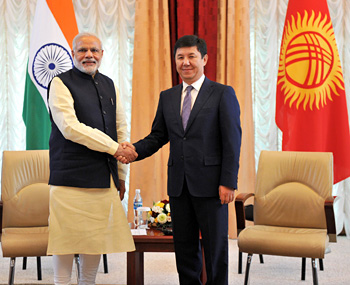
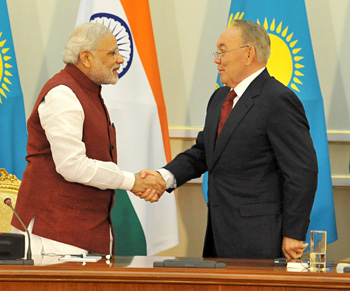
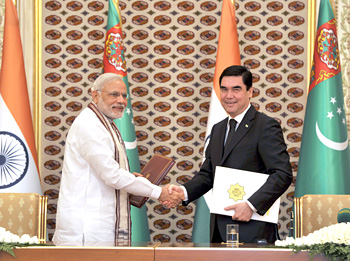
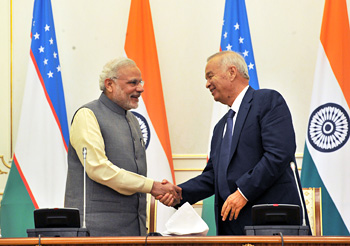
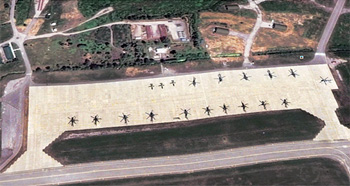
In a recent interview to Rediff.com former NSA Shiv Shankar Menon has accused the Modi government of a western tilt, keeping China and Pakistan guessing and lack of strategic vision. But he fails to discuss the monumental foreign policy deficits that the UPA government failed to address while he was the NSA; one of them being Central Asia that Prime Minister Modi is now addressing.
One of the biggest strategic blunders of Nehru was halting our army pursuing fleeing Pakistani marauders in 1948, thereby leaving the entity POK that gave Pakistan the temporary border with China, it never legally had. Not having the link with Afghanistan through the Wakhan Corridor and Pakistan's abhorrence to provide a land link between India and Afghanistan perhaps caused Indian policy makers lose sight of the importance of Central Asia despite Central Asia having ancient historic and cultural links with India that even the barbaric rise of Temur Lang could not wipe out. It is those links that Prime Minister Modi is revising, acknowledging the strategic importance of the region.
India was traditionally well regarded in Central Asia but paradoxically maintained marginal presence even politically and economically. It was during the previous NDA regime that Defence Minister George Fernandes first raised the issue of why we did not have military ties with the Central Asian Republics (CAR). Collapse of the Soviet Union dramatically changed the geopolitics of Central Asia capturing the interest of global powers because in the CAR because of great reserves in hydrocarbons and straddling the transit routes into the rest of Eurasia. CAR have great strategic potential for South Asia, and India in balancing Pakistani influence and promoting stabilization of Afghanistan especially since Pakistan always regarded Afghanistan as her strategic depth, which appears to have been handed to her on a plate by Afghan President Ashraf Ghani. The CAR together with Iran actually amount to India's strategic depth in the west.
In 2001, India had set up military hospitals in Tajikistan that served wounded of Northern Alliance during the fight with Taliban. Tajik-Indian relations are vital for establishing India's military presence in Central Asia but previous efforts had been thwarted by Russian reservations leading to delays and subsequent cancellation of what would have been India's first military base overseas at the Ayni air base. The Ayni air base is located near the Tajik-Afghan border and could potentially be the key to securing Indian interests in Afghanistan.
India now wants to reopen the military hospital and extending Indian presence at the Fakhor Air Base. Russia will have a say in influencing India-Tajikistan relations and the Indo-Russian strategic partnership needs to be optimized in this context. India needs to project itself as engaging Central Asia as a mutually beneficial endeavour and that is what Prime Minister Modi has managed to convey during his recent visit; reviving historical ties and through economic cooperation. The ONGC has already acquired stakes in Kazakh oilfields. The stalled TAPI (Turkmenistan-Afghanistan-India) pipeline project also appears to be looking up albeit its safe transit through Pakistan will always remain a question mark. India is also tied up with Kazakhstan in civil-nuclear cooperation. Then there is partnership with Uzbekistan in its domestic LNG market. Trade with CAR countries has to follow the circuitous route via Iran but with Indo-Iranian cooperation in developing Chabahar port and Iranian railway reaching north to Central Asia and being extended to Herat in Afghanistan, it is very much possible.
The nuclear deal between Iran and the West has brightened these prospects even more. India's trade with CAR countries has been quite nominal. With Kazakhstan, which was India's largest bilateral trading partner in Central Asia in 2010, bilateral trade was only US$ 210 million. Uzbekistan was at second place with bilateral trade at US$ 73.43 million, Turkmenistan at third place with at US$ 37.91 million, Tajikistan fourth at US$ 34.06 million, and Kyrgyzstan last at US$ 25.21 million. According to some estimates, there is potential for India to conduct trade with CAR and Afghanistan to the tune of US$ 450-500 billion. India and Kazakhstan signed a memorandum in December 2002 enabling joint projects for training military officers, establishing joint military-industrial projects and establishing partnership between defence industries of both countries. India is also supporting Kazakhstan to develop naval fleet in the Caspian Sea. In 2009, India-Kazakhstan signed a civil nuclear pact vide which Kazakhstan is to supply Uranium to India. During PM Modi's recent visit five key joint agreements were signed including a defence pact to enhance military cooperation and a contract for supply of uranium. In Uzbekistan, PM Modi held talks with Uzbekistan President Islam Karimov on key bilateral and regional issues including the situation in Afghanistan. Three pacts were signed to boost cooperation between foreign offices and in the field of culture and tourism.
The Indo-Uzbek Joint Working Group on Counter Terrorism is to meet later this year. Both leaders also agreed to strengthen cooperation in defence, cyber security, expanding economic cooperation, combating terrorism, advancing stability in the region and promoting regional integration. Supply of 2,000 metric tons of uranium from Uzbekistan to India, which had already been agreed to during 2014, was also discussed. The PMs also explored initiatives to enhance connectivity between the two countries, including Uzbekistan becoming member of the International North South Transport Corridor and Uzbekistan supporting India joining the Ashgabat Agreement, latter being a transit pact established in 2011 between Uzbekistan, Iran, Turkmenistan and Oman. PM Modi also visited the Memorial of Late Indian Prime Minister Lal Bahadur Shastri and unveiled the statue of Rabindranath Tagore. In Turkmenistan, Modi had extensive discussions with PM Gurbanguly Berdimuhamedov on bilateral, regional and international issues of mutual interest, expressing satisfaction on development of bilateral relations based on deep-rooted civilizational, historical and cultural linkages and shared interest in international and regional peace and stability. They noted that the bilateral Intergovernmental Joint Commission on trade, economic, scientific and technological cooperation had identified new areas of cooperation in April 2015.
A Defence Cooperation Agreement was signed during Modi's visit and both leaders resolved to mutually step up efforts against cross-border threats including terrorism, organized crime and illegal drug trafficking. They also resolved to enhance cooperation in trade, energy, petrochemicals, transport, communications, IT, science and technology, textiles and agro-processing. In 2002, India and Tajikistan had signed a bilateral defence agreement, one component of which was the repair of a disused Soviet airbase, Ayni, 10 km west of Dushanbe. The IAF planned to base a squadron of Mi-17 transport helicopters there and also train Tajik Air Force pilots. The Border Roads Organization spent $70 million (Rs 443 crore) to refurbish the airbase in 2007, lengthening its runway to 3.2 kms, and building hangars and an air traffic control tower. Resistance, however, came from Russia, which considers Tajikistan within its sphere of influence. In 2007, Russia pressurized the Tajik government to deny India access to the airbase, and the plans went into cold storage. During PM Modi's recent visit, India agreed to set up computer labs in 37 schools of Tajikistan for supporting Government of Tajikistan's human resource and skill development efforts. PM Modi has also reportedly asked Tajikistan for the lease of Ayni air base that was refurbished by India in 2007. However, this may be resisted by China, Russia and Pakistan.
India and Pakistan have both been admitted as members of SCO. As for Modi's visit to Kyrgyzstan, India and Kyrgyzstan have inked four agreements, including in defence cooperation and between their election commissions, The agreement on defence cooperation was in matters relating to defence, security, military education and training, conduct of joint military exercises, exchange of experience and information, exchange of military instructors and observers. Two agreements comprised an MoU between Kyrgyzstan's economy ministry and the Bureau of Indian Standards on cooperation in the field of standards, and an agreement on cooperation in culture. Earlier, Special Forces of the two countries had held a joint exercise in March 2015. Prime Minister Narendra Modi's focus on Central Asia, in conjunction India's immediate neighbourhood, China's periphery, policy of 'act east' and engaging the west are commendable initiatives in bridging the voids in Indian foreign policy, which had earlier centred largely on 'look east' and the Indo-US Nuclear Deal with latter having gone sterile after its signing. Central Asia is strategically important to India in addition to its hydrocarbons meeting our energy requirement, supply of uranium and trade — all essential to help India attain its rightful place in the comity of nations.





